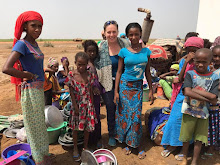“I heard you teach yoga in your home in Urdu to a group of Pakistanis.”
“Ahh, yes I do. Are you interested in learning Ashtanga?” I wonder how a random woman got my cell phone number and knows about the yoga classes I teach.
“Actually, I host the Mornings with Farah show on ATV, and I would like to send a crew to your house to film your class and then have you on the show as a guest.”
“It’s nice to meet you, Farah. Let me check with the Embassy, see if I can get permission, and get back to you.” How hilarious, I think to myself: What if I end up teaching yoga on a live TV show in Urdu?
A few months later, there I am, sitting cross-legged on my yoga mat in the studio, hoping and praying my Urdu will be intelligible, wondering if I should teach meditation or Sun salutations, and triple checking that my shirt is long enough to cover my lower back when I bend forward.
The Mornings with Farah show is broadcast into about 25 million homes on the government TV channel. It’s the morning show people watch that don’t have cable, the ones who can’t afford the Nadia Khan show. Like most morning talk shows that have a news segment, cooking segment, and daily guests, the target audience for Mornings with Farah is women who stay at home. There are a lot of these in Pakistan.
As I contemplate if I should actually try and teach some nameless, faceless, Multani homebound woman how to correctly move through a sun salutation, or focus on how to teach her to breath properly, I decide to envision someone I know who is watching, my friend Ammara’s mother. I try to imagine what she might be ready to try.
As you can see from these You Tube clips, I tried multiple formats. Sometimes I took calls from at home viewers, “ Will yoga make me taller? Will yoga reduce my varicose veins?” they asked. I just hoped and prayed I could understand the questions, and figured the answer would come from the experience I gained over the past 10 years cultivating a daily yoga and meditation practice.
The most useful feedback came from the children of my Urdu teacher. “Dad,” they said, “You really need to give Amy an Islamic touch.” Naseem and I discussed just what this meant. It turns out that opening a yoga segment on Pakistani TV with the mantra “Om” is not so effective.
Many Pakistanis in the target audience for this show have an allergic reaction to this term, so we replaced “Om” with the first three sounds in the Holy Quran. If you watch closely, you will see me start with the chant, Aliph, Laam, Miim. These sound vibrations are a prayer, that brings the Quran, brings God, back into the center of our minds for a moment before we begin.
The ladies on the show who did my makeup were most worried about my feet. When I walked from the changing room to the studio barefoot, my feet turned a faint shade of black. And as they sat in the dressing room, watching the segment, their concern was never my posture, the teaching, or even my Urdu. They were tuned into how I looked. Was my shirt ironed, were my feet black? Being on TV was new to me, and it really showed.
Over the months that I did the show, I kept wondering is there anyone out there who is actually learning the postures, sitting up straight, breathing correctly with movement. On my last trip to Karachi, I was waiting for my bag to come through the security check. The man who looked carefully at the screen, checking the contents, looked up and said, “Hey, aren’t you the yoga lady?” Thrilled that this just might be the guy, I asked enthusiastically, “Yes, I am. Are you doing the postures, learning to mediate?”
“Of course not,” he said, “it’s just fun to watch.”
Yikes!
This is not what I had in mind. Slightly discouraged, I went for coffee.
Much to my surprise, the young man who served it also said, “Excuse me, do you teach yoga on ATV?” “Yes, that’s me.” I said.
He then stood proud and tall in a yoga Tadasana, took a deep inhale, and sounded a perfect “Aliph, Laaaam, Miiim.” “My sister and I do it together each morning.”



